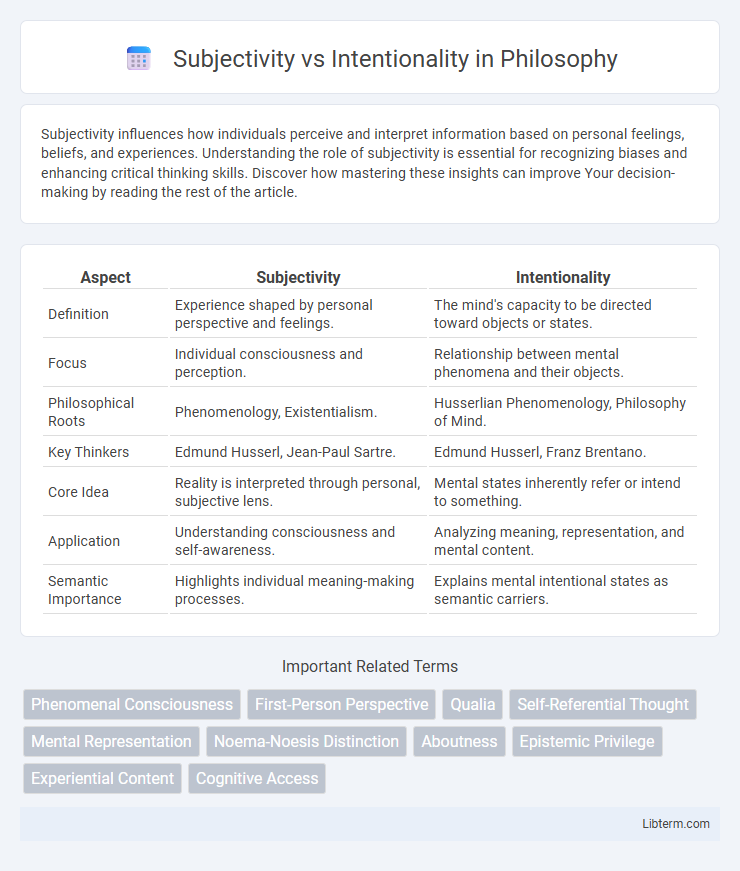Subjectivity influences how individuals perceive and interpret information based on personal feelings, beliefs, and experiences. Understanding the role of subjectivity is essential for recognizing biases and enhancing critical thinking skills. Discover how mastering these insights can improve Your decision-making by reading the rest of the article.
Table of Comparison
| Aspect | Subjectivity | Intentionality |
|---|---|---|
| Definition | Experience shaped by personal perspective and feelings. | The mind's capacity to be directed toward objects or states. |
| Focus | Individual consciousness and perception. | Relationship between mental phenomena and their objects. |
| Philosophical Roots | Phenomenology, Existentialism. | Husserlian Phenomenology, Philosophy of Mind. |
| Key Thinkers | Edmund Husserl, Jean-Paul Sartre. | Edmund Husserl, Franz Brentano. |
| Core Idea | Reality is interpreted through personal, subjective lens. | Mental states inherently refer or intend to something. |
| Application | Understanding consciousness and self-awareness. | Analyzing meaning, representation, and mental content. |
| Semantic Importance | Highlights individual meaning-making processes. | Explains mental intentional states as semantic carriers. |
Understanding Subjectivity: A Foundational Overview
Understanding subjectivity involves recognizing the personal perspectives, emotions, and individual experiences shaping how information is perceived and interpreted. It contrasts with intentionality, which centers on the purpose and directedness of mental states toward objects or goals. Mastery of subjectivity is foundational in fields like philosophy, psychology, and cognitive science, where it clarifies how consciousness and personal bias influence knowledge and behavior.
Defining Intentionality in Philosophy and Psychology
Intentionality in philosophy and psychology refers to the capacity of the mind to be directed toward objects, states, or concepts, embodying the "aboutness" of mental phenomena. This concept differentiates mental acts like beliefs or desires as inherently about something, distinguishing them from mere physical processes. Philosophers such as Franz Brentano pioneered the analysis of intentionality as a fundamental feature of consciousness, while psychologists explore its role in cognition and perception.
Historical Perspectives on Subjectivity vs Intentionality
Historical perspectives on subjectivity versus intentionality trace back to philosophical inquiries in phenomenology and existentialism, with figures like Husserl emphasizing the intentional structure of consciousness where mental acts are always directed toward objects. Early modern philosophers such as Descartes introduced a notion of subjectivity centered on self-awareness, while later thinkers like Heidegger expanded intentionality to encompass being-in-the-world and contextual existence. This evolution highlights a shift from viewing subjectivity as isolated inner experience to understanding it as inherently relational and intentional.
Core Differences Between Subjectivity and Intentionality
Subjectivity refers to personal perspectives, feelings, and opinions shaping an individual's experience, while intentionality is the directedness of the mind toward objects, ideas, or states of affairs, emphasizing purposeful mental engagement. Core differences include subjectivity's emphasis on internal, qualitative consciousness contrasted with intentionality's focus on the representational content and goal-oriented nature of thought. Understanding these distinctions clarifies debates in phenomenology, cognitive science, and philosophy of mind regarding how mental states relate to reality and self-awareness.
The Relationship Between Consciousness and Intentionality
Consciousness inherently involves intentionality, as mental states are directed toward objects or states of affairs, reflecting the mind's capacity to represent and be about something. This relationship underscores that intentionality is a fundamental characteristic of conscious experience, differentiating mere reactions from meaningful mental engagement. Philosophical frameworks such as phenomenology emphasize the unity between subjective awareness and intentional content, highlighting how consciousness structures reality through intentional acts.
Subjectivity in Cognitive Science: Key Insights
Subjectivity in cognitive science refers to the personal, experiential perspective through which individuals perceive and interpret the world, highlighting the role of consciousness and internal mental states. It emphasizes the importance of phenomenological experience and how subjective awareness shapes cognitive processes such as memory, perception, and decision-making. Understanding subjectivity is crucial for exploring how meaning and intentional states arise from individual mental frameworks within cognitive models.
The Role of Intentionality in Human Experience
Intentionality plays a crucial role in human experience by directing consciousness toward objects, goals, or states, making experiences meaningful and purposeful. Subjectivity shapes how intentions are felt and interpreted, influencing perception and emotional responses. Understanding intentionality clarifies how individuals ascribe meaning to their experiences and interact with the world through deliberate mental states.
Subjectivity vs Intentionality in Literary Theory
Subjectivity in literary theory refers to the personal perspectives, emotions, and biases that shape a reader's or author's interpretation of a text, emphasizing individual experience. Intentionality focuses on the author's intended meaning or purpose behind the work, highlighting the importance of authorial design and context. The tension between subjectivity and intentionality drives critical debates about whether meaning is determined by the creator or constructed through the reader's engagement.
Contemporary Debates: Bridging or Dividing the Concepts
Contemporary debates on subjectivity and intentionality explore whether these concepts should be bridged or kept distinct within philosophy of mind and cognitive science. Subjectivity emphasizes personal experience and consciousness, while intentionality centers on mental states directed toward objects or states of affairs, raising questions about their interdependence or dissociation. Recent discussions analyze how integrating these concepts can enrich understanding of consciousness, yet also highlight challenges in reconciling phenomenological experiences with representational content.
Implications for Future Research in Mind and Meaning
Subjectivity and intentionality play crucial roles in understanding consciousness and meaning-making, suggesting future research should integrate phenomenological methods with cognitive neuroscience to unravel their neural correlates. Exploring the dynamic interplay between subjective experience and intentional states can deepen insights into how meaning is constructed and communicated across diverse contexts. Advancing models that encompass both first-person perspectives and objective analyses promises transformative implications for theories of mind, language, and artificial intelligence.
Subjectivity Infographic

 libterm.com
libterm.com